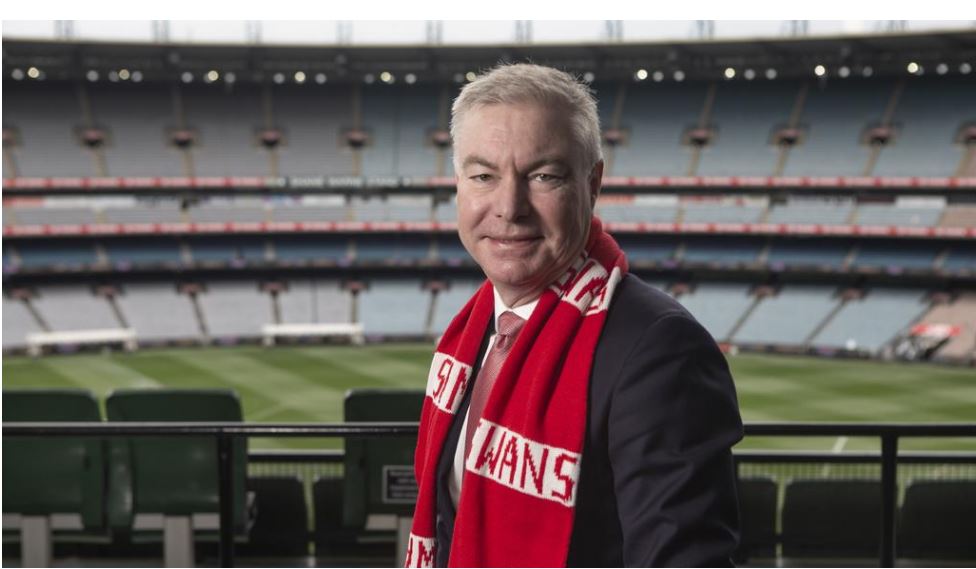
Article by Matthew Cranston and Jared Lynch, and atul Arya, courtesy of The Australian

Sydney Swans chairman and local boss of global investment bank Moelis, Andrew Pridham, has lambasted Labor’s unrealised capital gains tax plans, calling them ill-conceived and a new sovereign risk for Australia’s perceptions internationally.
Mr Pridham is the latest major business leader to speak up against Labor’s new tax policy during the election campaign. after CSL chairman Brian McNamee denounced the Albanese government’s new tax which will likely need the support of the Greens and could end up affecting as many as 1.8 million Australians.
Labor wants to tax people on gains they make on any assets held in their superannuation accounts, starting with those with a balance of $3m or more.
But concerns are growing that initially targeting of wealthier accounts is a “Trojan horse” for a wider application of the tax.
Mr Pridham said that not only was there a risk that the tax would spread but it was also a sovereign risk for investment in Australia.
“I think that it is ill-conceived and fundamentally unfair,” Mr Pridham told The Australian.
“The reality is that as a new tax it will have many consequences.
“When any government policy, such as taxing unrealised gains, goes where no government has gone before, and when it is fundamentally unfair and unprecedented, without doubt, it increases sovereign risk concerns,” he said.
Moelis has raised money for hundreds of companies that have supported jobs growth and economic activity.
“If governments want people and corporations to pay more in tax, then develop policy that does that. However, if the policy involves methodologies that are fundamentally unfair and lacking in commerciality, that it is not good policy.”
On Friday, other business leaders joined the chorus of concerns over the policy which will force superannuates to pay tax on unrealised gains of up to 30 per cent, but not be compensated if those gains suddenly reverse into losses.
The co-founder of Square Peg, Paul Bassat said if Labor was able to bring in unrealised capital gains tax it would be a disaster.
“The idea of levying tax on unrealised capital gains is a really bad idea. It is an awful precedent and is going to create unintended consequences,” he said.
“The real issue is that it is another example of government tinkering with tax policy when what we need as a country is a serious debate about what our tax policy should be. We need to have the right policy to create the right incentives to drive growth and increase prosperity.”
The Australian revealed this week that $25bn could be taken out of self-managed super funds by retirees wanting to avoid the new tax. That would leave a massive hole in funding important start-up businesses, which Mr McNamee said were crucial for bring new jobs and economic activity.
The Coalition will include its refusal to go through with the UCGT in its election costings to be released next week, at a cost of around $2.5bn to its bottom line.
Jim Chalmers was approached for comment.
Tech Council of Australia chief executive Damian Kassabgi opposes the proposed so called “Division 296 tax” on unrealised gains, as it will have a negative effect on early stage tech investment in Australia.
“Over the last decade, Australia has built a strong ecosystem for early stage tech investment, of which the superannuation system, and particularly SMSFs, plays a major role. It is critical that this source of capital is available locally so that the next generation of Australian tech start-ups can grow, especially at the angel investment stage, where established venture funding or offshore investment are not viable options,” Mr Kassabgi said.
“Valuations of tech companies can increase rapidly, yet liquidity events are often not available for many years. Under the proposed Division 296 framework, these early stage tech investments could generate large tax liabilities that could not sustainably be met within a fund.
“The Australian tax system currently recognises this by levying taxes only when such gains are realised.”
International tax law expert, K&L Gates’ Betsy-Ann Howe, said such a tax would not be viewed well both inside and outside Australia.
“Taxing unrealised gains is poor tax policy. It was something mooted in the Biden Harris US election campaign as well and was considered one of the reasons why the Democrats failed in the US elections,” Ms Howe said.
“Given the volatility of some of the asset classes which might be affected, such as equities but also real estate, taxing unrealised gains on an annual basis can have very adverse effects for taxpayers, particularly when reliance will be on a valuation done annually.”
Veteran business leader Tony Shepherd said Labor’s plan for an unrealised capital gains tax on superannuation accounts was “outrageous” and akin to communism and would drive investment away from Australia.
Mr Shepherd, whose roles have ranged from leading the Business Council to Australia to chairing Greater Western Sydney Giants – said the plan would also weaken the economy.
“It’s outrageous. It’s a fundamental of tax that you do not pay tax on something until you’ve actually earned it. I think it’s ridiculous,” Mr Shepherd said.
